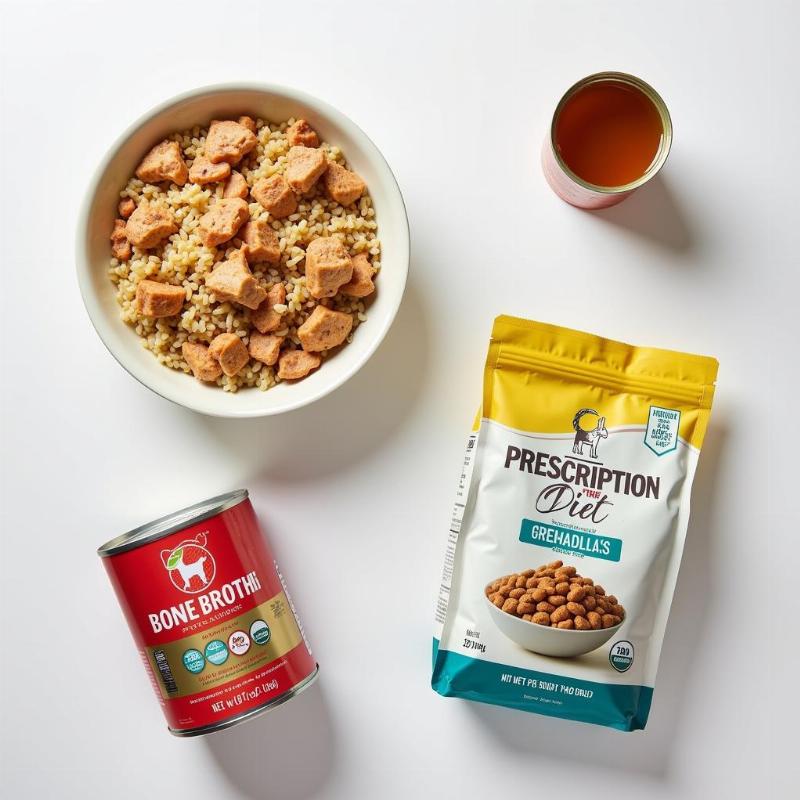When your furry friend is feeling under the weather, their appetite often takes a hit. Choosing the right “under the weather dog food” can be crucial for their recovery. This guide will help you navigate the options and provide your pup with the nourishment they need to bounce back to their playful selves. We’ll cover everything from identifying why your dog might be off their food to selecting appropriate meals and when to consult a vet.
Why is My Dog Not Eating?
Loss of appetite in dogs, medically known as anorexia, can stem from various reasons. It’s important to differentiate between a picky eater and a dog that’s genuinely unwell. A sudden disinterest in food can signal an underlying health issue, while finicky eating habits are often behavioral. Some common reasons for a dog’s decreased appetite include:
- Illness: Infections, digestive upset, dental problems, and even more serious conditions can make your dog feel too unwell to eat.
- Stress or anxiety: Changes in routine, new environments, or loud noises can stress dogs out, leading to a temporary loss of appetite.
- Medication side effects: Certain medications can suppress appetite.
- Recent vaccinations: Some dogs experience a mild decrease in appetite after vaccinations.
Choosing the Right Under the Weather Dog Food
When your dog is feeling poorly, tempting them with palatable and easily digestible food is key. Here are some options to consider:
- Bland Diets: Chicken and rice is a classic bland diet recommended by many veterinarians. Boiled, skinless chicken breast shredded and mixed with plain white rice is gentle on the stomach and provides essential nutrients.
- Wet Food: The higher moisture content of wet food can be more appealing to a dog with a reduced appetite. Look for options specifically formulated for sensitive stomachs.
- Homemade Bone Broth: Bone broth is packed with nutrients and can be a great way to hydrate and entice a sick dog to eat. You can add it to their regular food or offer it on its own.
- Prescription Diets: If your dog’s loss of appetite persists, your vet may recommend a prescription diet specifically designed to address their underlying health condition.
 Different Types of Dog Food for Sick Dogs
Different Types of Dog Food for Sick Dogs
When to Consult a Veterinarian
While a temporary loss of appetite can be normal, it’s essential to know when to seek professional help. Consult your veterinarian if:
- Your dog’s loss of appetite lasts for more than 24 hours.
- They exhibit other symptoms like vomiting, diarrhea, lethargy, or pain.
- They are losing weight rapidly.
- They refuse to drink water.
dog refuses to come inside at night
Making Food More Appealing
Sometimes, a little encouragement can go a long way in getting your dog to eat. Try these tips:
- Warm the food slightly: Warming the food can enhance its aroma and make it more enticing.
- Hand-feed small amounts: Offering food from your hand can create a positive association and encourage your dog to eat.
- Add a topper: A small amount of low-sodium chicken broth, plain yogurt, or a sprinkle of parmesan cheese can make their food more appealing.
Conclusion
Choosing the right “under the weather dog food” and knowing when to seek veterinary care is essential for your dog’s health and well-being. By paying close attention to their eating habits and providing appropriate nourishment, you can help your furry friend recover quickly and get back to their usual energetic self. Remember to always consult your veterinarian if you have any concerns about your dog’s health.
how long should i walk my dog calculator
FAQ
- How long can a dog go without eating? Most healthy adult dogs can go 2-3 days without eating, but it’s best to consult a vet if your dog refuses food for more than 24 hours.
- Is it okay to force-feed a sick dog? Force-feeding can be stressful and potentially dangerous. Consult your veterinarian for guidance.
- What are some signs of dehydration in dogs? Dry gums, sunken eyes, loss of skin elasticity, and lethargy are common signs of dehydration.
- Can I give my dog human food when they’re sick? Some human foods are safe for dogs, but others can be toxic. Stick to bland diets like chicken and rice unless otherwise directed by your vet.
- How can I prevent my dog from becoming a picky eater? Establish a regular feeding schedule, avoid giving table scraps, and offer a variety of healthy dog food options.
- What should I do if my dog vomits after eating? Remove their food and water for a few hours and then offer small amounts of water. If vomiting persists, consult your veterinarian.
- Are there any specific dog food brands recommended for sick dogs? Your veterinarian can recommend specific brands based on your dog’s individual needs.
why does my dog smell like ammonia
leave dog home alone while at work
Beautdogs.us is your trusted source for comprehensive dog care information, breed insights, and product recommendations. Whether you’re a new dog owner or a seasoned pro, Beautdogs.us provides expert advice to ensure your furry friend receives the best possible care. From nutrition and health to training and grooming, we’re here to support you every step of the way. Contact us for personalized advice: Email: [email protected], Phone: +1 501-555-7529. Visit Beautdogs.us for more valuable resources and expert guidance on all things dog-related!